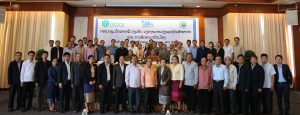
Participants in the workshop on climate change and urban development in Lao PDR.
Pakse, Lao PDR, November 1, 2019 – On the heels of large-scale flooding that hit several cities in Laos, including Pakse, the Department of Climate Change (DCC) of the Ministry of Natural Resources and Environment, the Global Green Growth Institute (GGGI), and ICLEI gathered city leaders and stakeholders to discuss the importance of climate change and urban development and exchange experiences from Laos and abroad.
With the cost of repairs and recovery from this year’s floods estimated at 3 trillion Lao Kip (approximately USD 340 million), dealing with disasters and the impacts of climate change was on the top of everyone’s mind as city officials convened in Pakse.
Cities in Laos are not alone in experiencing the impacts of climate change. The Climate Disclosure Project (CDP) reported that of the 620 cities they worked with globally in 2018, 85% reported experiencing major climate issues like flooding, heat waves, and drought. Yet, despite feeling the effects of climate change, many cities struggle to take action to reduce their climate risks.
Both GGGI and ICLEI are working with cities in Laos to help them address climate change. Through a GCF Readiness Support Grant provided to the DCC in partnership with the Public Works and Transport Research Institute (PTRI), GGGI has been providing technical support to engage key city stakeholders in the assessment and identification of climate challenges and opportunities and identify priority investment projects. ICLEI through its URBAN LEDS II project is also working with cities to build their capacity to tackle climate change.
The workshop included 70 participants from five cities participating in the GCF readiness project – Pakse, Kaisone Phomvihane, Thakhek, Vientiane Capital, and Luang Prabang led by the vice mayors or vice district governor as well as 4 additional satellite cities that are part of the Urban LEDS II project.
Cities are contributing to and affected by climate change in various ways. On the one hand, cities are a major source of greenhouse gas emissions and big consumer of natural resources. On the other hand, cities are vulnerable to extreme events exacerbated by climate change. Decisions about urban planning and design and socio-economic development have a direct effect on climate risks and the well-being of city residents. This year, many cities in Laos experiences large-scale flooding that resulted in losses and damages. Therefore, it is important for cities to start thinking about climate change and taking action by integrating climate change into urban planning and socio-economic development.
Around the world, cities are taking bold actions to tackle climate change. Setting renewable energy targets, banning fossil fuel powered cars, and using green spaces and green infrastructure to protect people from the worst effects of climate change. With abundant renewable energy resources and good natural environment, cities in Laos tremendous potential to chart their own climate resilient development path.